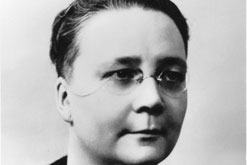 Dorothy L. Sayers (1893-1957) was a well-known British author, playwright, and scholar. Graduating from Oxford University in 1915, she was among one of the first groups of women to achieve this distinction. Sayers had a knack for unmasking misperceptions of the faith. In her day, efforts to redefine Christian practice and teachings were fueled by an apparent boredom with presentation of doctrine. In her Letters to a Diminished Church: Passionate Arguments for the Relevance of Christian Doctrine, she countered this mentality, critiquing the appalling apathy and biblical ignorance of those who called themselves “Christian.” Sadly, though, times have not much changed and her words are as pointed as ever.
Dorothy L. Sayers (1893-1957) was a well-known British author, playwright, and scholar. Graduating from Oxford University in 1915, she was among one of the first groups of women to achieve this distinction. Sayers had a knack for unmasking misperceptions of the faith. In her day, efforts to redefine Christian practice and teachings were fueled by an apparent boredom with presentation of doctrine. In her Letters to a Diminished Church: Passionate Arguments for the Relevance of Christian Doctrine, she countered this mentality, critiquing the appalling apathy and biblical ignorance of those who called themselves “Christian.” Sadly, though, times have not much changed and her words are as pointed as ever.
Official Christianity, of late years, has been having what is known as a bad press. We are constantly assured that the churches are empty because preachers insist too much upon doctrine—dull dogma as people call it. The fact is the precise opposite. It is the neglect of dogma that makes for dullness. The Christian faith is the most exciting drama that ever staggered the imagination of man—and the dogma is the drama.
Now, we may call [Christian] doctrine exhilarating, or we may call it devastating; we may call it revelation, or we may call it rubbish; but if we call it dull, the words have no meaning at all. That God should play the tyranny over man is a dismal story of unrelieved oppression; that man should play the tyrant over man is the usual dreary record of human futility; but that man should play the tyrant over God and find Him a better Man that himself is an astonishing drama indeed. Any journalist, hearing of it for the first time, would recognize it as news; those who did hear it for the first time actually called it news, and good news at that; though we are likely to forget that the word Gospel ever meant anything so sensational.
. . . . for the cry today is: “Away with the tedious complexities of dogma—let us have the simple spirit of worship; just worship, no matter of what!” The only drawback to this demand for a generalized and undirected worship is the practical difficulty of arousing any sort of enthusiasm for the worship of nothing in particular.
It would not perhaps be altogether surprising if, in this nominally Christian country [Britain], where the creeds are daily recited, that there were a number of people who knew all about Christian doctrine and disliked it. It is more startling to discover how many people there are who heartily dislike and despise Christianity without having the faintest notion of what it is. If you tell them, they cannot believe you. I do not mean that they cannot believe the doctrine; that would be understandable enough since it takes some believing. I mean that they simply cannot believe that anything so interesting, so exciting, and so dramatic can be the orthodox creed of the Church.
Surely it is not the business of the Church to adapt Christ to men, but to adapt men to Christ.
It is the dogma that is the drama—not beautiful phrases, nor comforting sentiments, nor vague aspirations to loving-kindness and uplift, nor the promise of something nice after death—but the terrifying assertion that the same God who made the world, lived in the world and passed through the grave and gate of death. Show that to the heathen, and they may not believe it; but at least they may realize that here is something that man might be glad to believe.